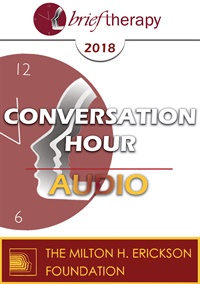BT18 Great Conversation 09 - Treating Trauma in Couples - Janina Fisher, PhD and Stan Tatkin, PSYD, MFT
- Average Rating:
- Not yet rated
- Topic Areas:
- Great Conversations | Couples Therapy | Trauma
- Categories:
- Brief Therapy Conference | Brief Therapy Conference 2018 | Pioneers in Couples and Family Therapy
- Faculty:
- Janina Fisher, PhD | Stan Tatkin, PsyD, MFT
- Duration:
- 1:02:50
- Format:
- Audio Only
- Original Program Date:
- Dec 08, 2018
- License:
- Never Expires.
Description
Description: Experts Janina Fisher and Stan Tatkin explore trauma's impact on couples, revealing how body language, nervous system responses, and memory formation shape relationship dynamics. They offer insights into recognizing trauma, improving communication, and helping couples heal together.
Syllabus Description: Trauma in couples includes infidelity, medical illness, and financial issues. Assessment and treatment will be covered.
Educational Objectives:
- Describe the components of how trauma effects couples.
- Given a couple in trauma, indicated treatment plan.
*Sessions may be edited for content and to preserve confidentiality*
Outline
Determining Trauma in Couples
- Different backgrounds and approaches contribute to how trauma is identified in couples.
- Nervous system dysregulation is a key indicator of trauma.
- A partner’s lack of attunement to the other’s trauma responses can be significant.
- Small "t" threats can escalate into larger relational issues over time.
Impact of Negativity Bias and Memory
- Negativity bias affects behavior and relationship dynamics.
- The brain encodes negative memories more quickly and vividly than positive ones.
- Quick repair of negative interactions is crucial to prevent long-term impact.
- Memory is shaped by intensity and duration—unresolved conflict can create lasting damage.
The Role of Eye Contact and Body Language
- Eye contact and body language play a significant role in therapy.
- Eye contact can activate the amygdala—sometimes calming, sometimes triggering.
- Maintaining eye contact supports present-moment awareness.
- Being attuned to non-verbal cues enhances communication and connection.
Handling Trauma in Couples Therapy
- Couples benefit from becoming more aware of their moment-to-moment impact on each other.
- Therapists must maintain regulation and flexibility to support both partners.
- Differing levels of trauma awareness can create challenges that need careful navigation.
Identifying and Addressing Disorganized Attachment
- Signs include inconsistent behavior, seductive or avoidant actions, and conflicting timelines.
- Alternating between pursuit and withdrawal may indicate trauma-based attachment patterns.
- Understanding a couple's relational history is essential.
- Therapist self-regulation is key to managing complex attachment dynamics.
Dealing with Acting Out and Self-Harm
- It's important to differentiate between acting out and genuine trauma responses.
- Therapy should not inadvertently reinforce destructive behaviors.
- Avoidance can be a survival strategy and should be understood, not judged.
- Addressing non-collaborative behavior is crucial for healing and safety.
Managing Different Paces of Recovery
- Partners may move through trauma recovery at different speeds.
- Therapists should explore underlying issues and promote collaborative behavior.
- Building new, positive shared experiences helps shift the emotional dynamic.
- External factors (e.g., substance use) should be addressed if they create division.
The Role of Individual Therapy
- Individual therapy can support recovery, especially when partners progress at different rates.
- Exploring the couple’s shared history helps contextualize current struggles.
- Focus remains on how individual behavior impacts the relationship.
- Creating new, positive memories together fosters healing.
Addressing Alcohol as a Third Party
- Substance use (like alcohol) can function as a disruptive “third party” in the relationship.
- It’s important to address how these behaviors affect the couple dynamic.
- Creating healthier coping mechanisms and shared positive experiences supports recovery.
The Importance of Secure Functioning
- Secure functioning requires collaboration, cooperation, and shared responsibility.
- The couple must prioritize the relationship regardless of past trauma.
- Building new, positive memories together is essential.
- Third-party disruptions (e.g., substances, external stressors) must be confronted directly.
Credits
Handouts
| Timestamped Transcript (893.7 KB) | 21 Pages | Available after Purchase |
| Ericksonian Learning Snapshot (275.7 KB) | 3 Pages | Available after Purchase |
Faculty

Janina Fisher, PhD Related Seminars and Products
Janina Fisher, PhD is a licensed Clinical Psychologist and Instructor at the Trauma Center, an outpatient clinic and research center founded by Bessel van der Kolk. Known for her expertise as both a therapist and consultant, she is also past president of the New England Society for the Treatment of Trauma and Dissociation, an EMDR International Association Credit Provider, a faculty member of the Sensorimotor Psychotherapy Institute, and a former Instructor, Harvard Medical School. Dr. Fisher has been an invited speaker at the Cape Cod Institute, Harvard Medical School Conference Series, the EMDR International Association Annual Conference, University of Wisconsin, University of Westminster in London, the Psychotraumatology Institute of Europe, and the Esalen Institute. Dr. Fisher lectures and teaches nationally and internationally on topics related to the integration of research and treatment and how to introduce these newer trauma treatment paradigms in traditional therapeutic approaches.

Stan Tatkin, PsyD, MFT Related Seminars and Products
Stan Tatkin, PsyD, MFT, is a clinician, researcher, teacher, and developer of A Psychobiological Approach to Couple Therapy (PACT®). He has a clinical practice in Calabasas, CA, where he has specialized for the last 15 years in working with couples and individuals who wish to be in relationships. He and his wife, Tracey Boldemann-Tatkin, developed the PACT Institute for the purpose of training other psychotherapists to use this method in their clinical practice.


